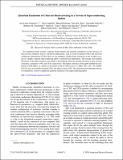Quantum Emulation of Coherent Backscattering in a System of Superconducting Qubits
Author(s)
Gramajo, Ana Laura; Campbell, Dan; Kannan, Bharath; Kim, David K; Melville, Alexander; Niedzielski, Bethany M; Yoder, Jonilyn L; Sánchez, María José; Domínguez, Daniel; Gustavsson, Simon; Oliver, William D; ... Show more Show less
DownloadPublished version (1.810Mb)
Publisher Policy
Publisher Policy
Article is made available in accordance with the publisher's policy and may be subject to US copyright law. Please refer to the publisher's site for terms of use.
Terms of use
Metadata
Show full item recordAbstract
© 2020 American Physical Society. In condensed matter systems, coherent backscattering and quantum interference in the presence of time-reversal symmetry lead to well-known phenomena, such as weak localization (WL) and universal conductance fluctuations (UCFs). Here we use multipass Landau-Zener transitions at the avoided crossing of a highly coherent superconducting qubit to emulate these phenomena. The average and standard deviations of the qubit transition rate exhibit a dip and peak when the driving waveform is time-reversal symmetric, analogous to WL and UCFs, respectively. The higher coherence of this qubit enabled the realization of both effects, in contrast to the earlier work by Gustavsson et al. [Phys. Rev. Lett. 110, 016603 (2013)], who successfully emulated UCFs, but did not observe WL. This demonstration illustrates the use of nonadiabatic control to implement quantum emulation with superconducting qubits.
Date issued
2020Department
Massachusetts Institute of Technology. Research Laboratory of Electronics; Lincoln Laboratory; Massachusetts Institute of Technology. Department of PhysicsJournal
Physical Review Applied
Publisher
American Physical Society (APS)